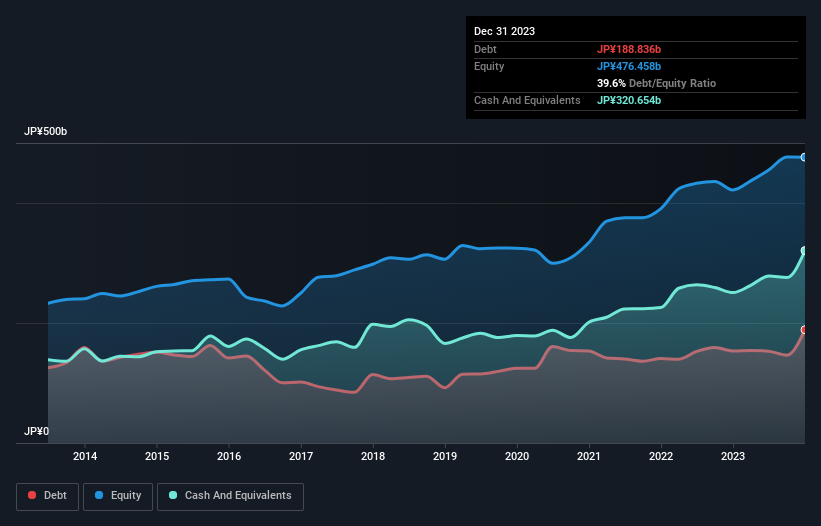The external fund manager backed by Berkshire Hathaway's Charlie Munger, Li Lu, makes no bones about it when he says 'The biggest investment risk is not the volatility of prices, but whether you will suffer a permanent loss of capital.' When we think about how risky a company is, we always like to look at its use of debt, since debt overload can lead to ruin. Importantly, Toyota Boshoku Corporation (TSE:3116) does carry debt. But should shareholders be worried about its use of debt?
When Is Debt Dangerous?
Generally speaking, debt only becomes a real problem when a company can't easily pay it off, either by raising capital or with its own cash flow. In the worst case scenario, a company can go bankrupt if it cannot pay its creditors. However, a more common (but still painful) scenario is that it has to raise new equity capital at a low price, thus permanently diluting shareholders. Of course, debt can be an important tool in businesses, particularly capital heavy businesses. When we examine debt levels, we first consider both cash and debt levels, together.
Check out our latest analysis for Toyota Boshoku
How Much Debt Does Toyota Boshoku Carry?
You can click the graphic below for the historical numbers, but it shows that as of December 2023 Toyota Boshoku had JP¥188.8b of debt, an increase on JP¥153.3b, over one year. But it also has JP¥320.7b in cash to offset that, meaning it has JP¥131.8b net cash.

How Strong Is Toyota Boshoku's Balance Sheet?
According to the last reported balance sheet, Toyota Boshoku had liabilities of JP¥436.2b due within 12 months, and liabilities of JP¥205.2b due beyond 12 months. Offsetting this, it had JP¥320.7b in cash and JP¥310.3b in receivables that were due within 12 months. So its total liabilities are just about perfectly matched by its shorter-term, liquid assets.
Given Toyota Boshoku has a market capitalization of JP¥447.5b, it's hard to believe these liabilities pose much threat. Having said that, it's clear that we should continue to monitor its balance sheet, lest it change for the worse. While it does have liabilities worth noting, Toyota Boshoku also has more cash than debt, so we're pretty confident it can manage its debt safely.
In addition to that, we're happy to report that Toyota Boshoku has boosted its EBIT by 97%, thus reducing the spectre of future debt repayments. There's no doubt that we learn most about debt from the balance sheet. But it is future earnings, more than anything, that will determine Toyota Boshoku's ability to maintain a healthy balance sheet going forward. So if you want to see what the professionals think, you might find this free report on analyst profit forecasts to be interesting.
Finally, a business needs free cash flow to pay off debt; accounting profits just don't cut it. Toyota Boshoku may have net cash on the balance sheet, but it is still interesting to look at how well the business converts its earnings before interest and tax (EBIT) to free cash flow, because that will influence both its need for, and its capacity to manage debt. Happily for any shareholders, Toyota Boshoku actually produced more free cash flow than EBIT over the last three years. That sort of strong cash conversion gets us as excited as the crowd when the beat drops at a Daft Punk concert.
Summing Up
We could understand if investors are concerned about Toyota Boshoku's liabilities, but we can be reassured by the fact it has has net cash of JP¥131.8b. And it impressed us with free cash flow of JP¥106b, being 114% of its EBIT. So we don't think Toyota Boshoku's use of debt is risky. When analysing debt levels, the balance sheet is the obvious place to start. But ultimately, every company can contain risks that exist outside of the balance sheet. Case in point: We've spotted 1 warning sign for Toyota Boshoku you should be aware of.
Of course, if you're the type of investor who prefers buying stocks without the burden of debt, then don't hesitate to discover our exclusive list of net cash growth stocks, today.
Valuation is complex, but we're here to simplify it.
Discover if Toyota Boshoku might be undervalued or overvalued with our detailed analysis, featuring fair value estimates, potential risks, dividends, insider trades, and its financial condition.
Access Free AnalysisHave feedback on this article? Concerned about the content? Get in touch with us directly. Alternatively, email editorial-team (at) simplywallst.com.
This article by Simply Wall St is general in nature. We provide commentary based on historical data and analyst forecasts only using an unbiased methodology and our articles are not intended to be financial advice. It does not constitute a recommendation to buy or sell any stock, and does not take account of your objectives, or your financial situation. We aim to bring you long-term focused analysis driven by fundamental data. Note that our analysis may not factor in the latest price-sensitive company announcements or qualitative material. Simply Wall St has no position in any stocks mentioned.
About TSE:3116
Toyota Boshoku
Develops, manufactures, and sells automotive interior systems in Japan, the United States, China, and internationally.
Flawless balance sheet average dividend payer.
Similar Companies
Market Insights
Community Narratives



